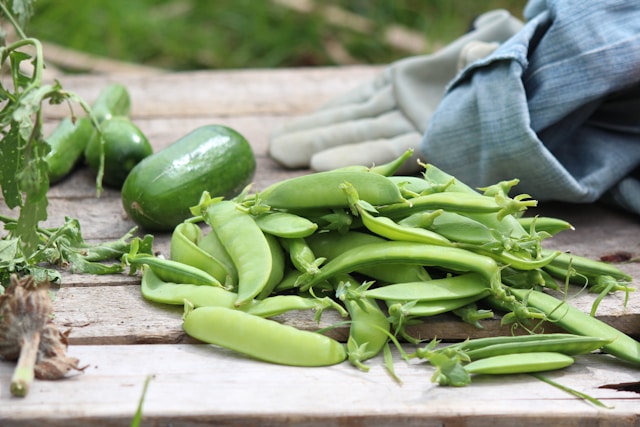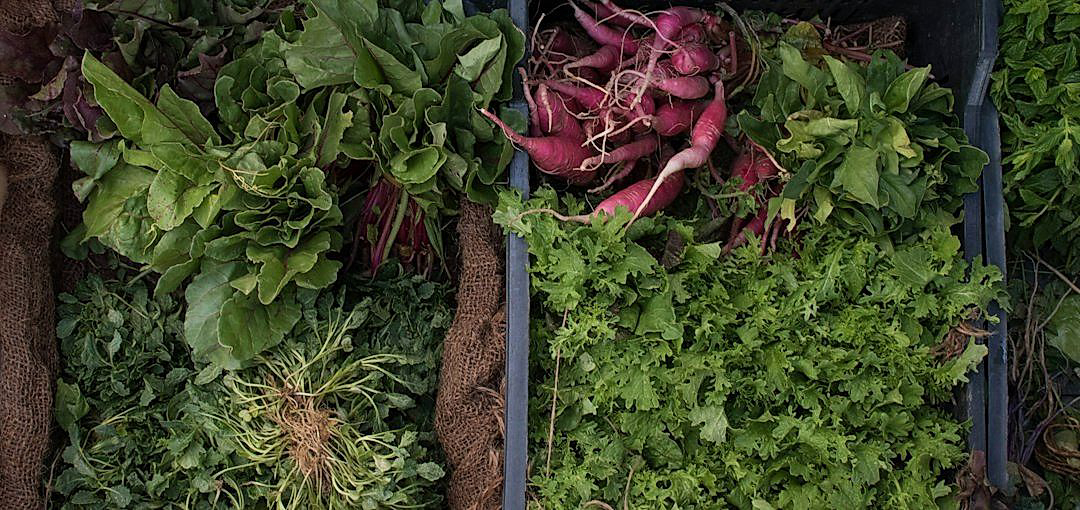As the global community seeks a solution to reduce greenhouse gas emissions, the spotlight increasingly centers on renewable energy, specifically biofuels.
Biofuels – energy sources produced from organic materials – have immense potential to shape both energy production and agricultural landscapes.
However, their emergence is not without consequence.
The expansion of biofuel production demands substantial changes in crop cultivation patterns around the world.
This growing sector’s influence is unfolding in various ways, some of which pose significant implications for existing agricultural practices.
This article explains how the biofuel industry’s innovative strides interact with the dynamics of crop production.
Contents [hide]
- Biofuel Innovations Affecting Crop Production
- 1. Algae-derived biofuels increasing crop diversity
- 2. Bio-char soil amendment improving yields
- 3. New GM crops for better biofuel production
- 4. Microbial Biofuel Production Reducing Fertilizer Usage
- 5. Biomass crops contributing to soil health
- 6. Crop residue biofuel impacting sustainable farming
- 7. Perennial Bioenergy Crops reducing soil erosion
- The Bottom Line
Biofuel Innovations Affecting Crop Production
1. Algae-derived biofuels increasing crop diversity
As the world navigates a path towards renewable energy solutions, algae-derived biofuels have presented a unique opportunity to leverage marine biodiversity towards meeting our energy needs.
Algae are microscopic, aquatic organisms, capable of photosynthesizing and have shown enormous potential as a sustainable source of energy-rich oils, suited for fuel production.
They possess versatile metabolic capabilities and can be manipulated to produce a variety of biofuels such as biodiesel, bioethanol, biogas, and biohydrogen.
One crucial advantage of algae-derived biofuels is they do not compete with food crops for arable land.
Most of the world’s energy at present comes from land-based crops such as corn and soybeans.
The cultivation of these crops on a large scale monopolizes arable land, limiting opportunities for crop diversity.
On the other hand, the production of biofuel from algae can be done in non-arable land such as deserts, using seawater, thereby releasing fertile lands for growing a variety of food crops.
As such, the shift towards algae-derived biofuels promotes crop diversity.
This increase in crop diversity enhances nutrition security, improves the resilience of farming systems against diseases and pests, and helps maintain ecosystem services.
Furthermore, algae biofuel production systems can be integrated with various waste sources to recycle nutrients efficiently and mitigate greenhouse gas emissions.
These systems can substantially decrease the pressures on agricultural soils by reducing the demand for high-yielding, mono-cropped energy crops.
In effect, an increase in crop diversity stemming from the advent of algae-based biofuels can indirectly contribute to soil health.
A larger variety of plants means a wider range of root system structures and functions, which can improve soil structure, nutrient cycling, and water holding capacity.
Moreover, diverse crop rotations can disrupt the life cycle of pests and diseases, reducing reliance on chemical controls and promoting a healthier ecosystem.
In sum, algae-derived biofuels are a promising pathway toward sustainable energy production and increased crop diversity.
Their potential in unlocking lands for diverse crop production alongside their waste recycling capability makes algae an underappreciated tool in our fight against climate change and food insecurity.
2. Bio-char soil amendment improving yields
Utilizing bio-char as a soil amendment has emerged as an innovative method in crop farming, potentially driving a notable uplift in crop yields.
Taking a closer look, bio-char is essentially a type of charcoal, generated from biomass through a process known as pyrolysis.
One of the key advantages of bio-char is its extensive lifespan, being able to remain in the soil for hundreds or even thousands of years.
When used as an amendment, bio-char can substantially improve the fertility and productivity of soil, serving as a remarkable way to boost crop yields.
In particular, bio-char is known for its unique ability to enhance the retention of nutrients in the soil.
This is critical considering the fact that nutrient loss can tremendously impede the production of crops, hence bio-char’s role in preventing this can significantly bolster crop yields.
Importantly, bio-char not only mitigates the loss of nutrients, but it also has the capacity to influence other vital soil properties.
For instance, bio-char has shown promising results in its potential to improve the soil’s water holding capacity, permitting more efficient use of water, a key factor influencing crop productivity.
Furthermore, bio-char can remarkably enhance soil pH, a crucial factor that can directly impact crop growth and development.
By doing so, bio-char can certainly contribute to a more conducive environment for crop production, and in turn, raise crop yields.
Moreover, the use of bio-char as a soil amendment potentially underlines a more sustainable approach to farming.
In comparison to conventional fertilizers, bio-char proves to be a more ecofriendly choice, given its ability to capture and store carbon, thereby reducing greenhouse gas emissions.
This proves the relevance of bio-char in fostering an innovative, environmentally-conscious approach to crop production, while concurrently increasing crop yields.
Therefore, it’s safe to say that the introduction of bio-char in the agricultural sector has not only provided a viable solution to enhancing crop yields but also paved the way for more sustainable farming practices.
Interestingly, the use of bio-char as a soil amendment is potentially an excellent example of how biofuel innovations can directly affect crop production.
Overall, this sheds light on the possibility of how the conversion of biomass into bioenergy could essentially circle back to significantly enhance crop production.
3. New GM crops for better biofuel production
The cultivation of genetically-modified (GM) crops specifically for the creation of biofuels represents a promising area of innovation within sustainable agriculture.
Genetically modifying plants allows scientists to give crops desired traits, with a view to increasing the suitability for biofuel production.
Advancements in genetic engineering are accelerating this potential by creating enhanced crops that yield more biofuel per acre than traditional crops.
The creation of GM crops tailored for biofuels could greatly increase fuel output without requiring additional farmland.
Some of these GM crops include corn, soybeans, and canola plants that have been modified to produce larger amounts of useful biomass, either via increased growth rates or by enhancing the plant’s oil content.
This scientific advancement is therefore significantly affecting crop production by promoting species that are particularly beneficial for creating biofuels.
The cultivation of GM crops for biofuel production not only has the potential to meet energy demands but also reduce the detrimental environmental impact associated with fossil fuels.
By investing in research and development of genetically modified biofuel crops, federal and private sector organizations could significantly contribute to carbon neutrality goals.
However, the use of GM crops also raises contentious issues relating to sustainability, biodiversity, and food security.
As such, laying a pragmatic and ethical framework for the deployment of GM crops for biofuels becomes essential for sustainable farming.
Understanding the socioeconomic implications of GM crop cultivation for biofuel production is also crucial in promoting the fair and just distribution of benefits.
Moreover, further research is needed to minimize the potential risks associated with GM crops, such as unforeseen environmental impacts or the creation of superweeds.
Despite these challenges, the potential for GM crops in the area of biofuel production cannot be overlooked, particularly given the growing pressure to transition to renewable energy sources.
Embracing the opportunity offered by genetically modified biofuel crops can deliver significant advancements in sustainable agriculture and contribute to efforts to mitigate climate change.
Ultimately, as we continue to refine these techniques and technologies, genetically modified crops will undeniably transform the landscape of crop production and biofuel development.
4. Microbial Biofuel Production Reducing Fertilizer Usage
One of the lesser-known yet crucial benefits of biofuel innovation is that microbial biofuel production could lead to decreased dependency on chemical fertilizers.
An overuse of chemical fertilizers can result in a myriad of environmental and health problems, from soil degradation to water contamination.
By moving towards microbial biofuel production, we are investing in a future that is not only more sustainable, but also environmentally friendly.
Microbial biofuels are produced by using microbes such as bacteria and yeast, which can convert organic matter into biofuels.
These microbes have the potential to decompose plant waste and convert it into fuel, thereby considerably reducing the necessity for chemical fertilizers.
This reduction in chemical fertilizer use not only contributes to better soil health but also decreases the footprint of harmful greenhouse gases.
Biofuels produced by microbes are not only renewable, but also help in reducing harmful emissions, thereby mitigating climate change.
One primary example of microbial biofuel is bioethanol, produced by the fermentation of sugars by yeast.
Incredible advancements have been made in genetic engineering techniques, which have allowed us to optimize the desired traits in these microbes for more efficient biofuel production.
Microbes can also be manipulated to consume various types of feedstocks, creating a possibility of diversified sources for biofuel production.
This not only presents us with an opportunity to produce biofuels from waste material but also helps us avoid the food vs fuel controversy.
Microbial biofuel production is being viewed as a promising and viable component of the energy mix for a sustainable future.
However, it’s important to note that significant scientific and technological advancements are still required to make microbial biofuel production more cost-competitive.
Overall, the shift towards microbial biofuels offers a new perspective in the pursuit of green energy and sustainable farming.
By harnessing the power of microbes, we are moving towards a future where agriculture and energy production work hand in hand to sustain our planet rather than deplete it.
5. Biomass crops contributing to soil health
The increasing popularity of biofuel production has led to a rise in the cultivation of biomass crops.
As these particular types of crops are grown specifically for energy production, they have unique attributes that significantly benefit soil health.
Biomass crops typically have deep and expansive root systems.
This characteristic not only aids in the secure anchoring of the plant but also contributes positively to the soil structure.
As these deep roots break up the soil, they enhance its porosity creating a conducive environment for root penetration and the efficient movement of water and nutrients.
Importantly, these root systems also assist in the prevention of soil erosion which is a significant concern in sustainable farming.
Furthermore, biomass crops facilitate the cycle of nutrients within the soil.
They achieve this through their ability to accumulate high amounts of nutrients from the soil which are then reincorporated back into the soil when the plants are harvested and processed.
This process helps to replenish nutrient levels, and maintain a balanced and healthy soil, ready for the next planting cycle.
It also minimizes the need for fertilizers, thereby reducing the associated environmental impacts.
The growth of biomass crops also actively improves soil organic matter content, a vital component of soil health.
Organic matter not only provides nutrients to plants but also enhances soil structure and boosts its capacity to absorb and hold water.
In this way, biomass crops can help maintain soil moisture levels, vital for plant growth and health.
Besides, biomass crops also contribute to carbon sequestration, an essential aspect of combating climate change.
These crops absorb carbon dioxide from the atmosphere during their growth and store it in their biomass, and subsequently in the soil, when they decompose.
This ability can make biomass crops a significant tool for carbon mitigation strategies in agriculture.
Therefore, the cultivation of biomass crops for biofuel production presents several substantial benefits not only for biofuel production but also for soil health and sustainability in agriculture.
6. Crop residue biofuel impacting sustainable farming
The transition from traditional fossil fuels to biofuels presents both a challenge and an opportunity for farming. Increasingly, crop residues — the leftovers from agricultural production — are considered as a potential source of biofuel.
Using crop residues for biofuel production can have significant impacts on sustainable farming practices.
The production of biofuel from crop residues can contribute to energy security, granting an additional source of income for farmers.
Additionally, it offers a use for what would otherwise be waste material, promoting efficiency and reducing impact on the environment.
Using crop residues as a raw material for biofuel production can form an integral part of a circular economy, where waste materials from one process become inputs for another, maximizing efficiency and sustainability.
However, crop residue biofuel is not without challenges. One of the foremost concerns relates to soil health and fertility.
Crop residues often contribute to soil health by adding organic matter back to the soil after harvest.
Removing crop residues for fuel may therefore impact soil nutrient levels and long-term productivity.
It is crucial to identify the optimal balance between removing crop residues for biofuel production and leaving enough behind to maintain soil health.
An understanding and implementation of sustainable harvesting practices, that consider both bioenergy production and soil health, are required.
Intensive research is ongoing to identify sustainable practices for crop residue management that can optimize biofuel production without compromising soil health.
Technological advances such as efficient conversion technologies could further improve the viability of crop residue biofuels.
By catalyzing the break-down of crop residues into simpler, easily converted compounds, these technologies offer the possibility of higher biofuel yields per residue weight.
Emerging innovations such as biochar, a type of charcoal produced from biomass, can also help address the sustainability implications.
Crop residue biofuel represents a fascinating opportunity in the transition to a bio-based economy, combining contributions to energy security, waste reduction, and potentially, sustainable farming practices.
7. Perennial Bioenergy Crops reducing soil erosion
Perennial bioenergy crops are plants that regrow every year without the need for replanting or seed distribution.
Their deep and extensive root systems contribute to their ability to reduce soil erosion.
These crops enhance soil structure and enrich the organic matter within the soil, making it less prone to erosion.
There is rapidly growing global interest in cultivating perennial bioenergy crops due to their multiple environmental benefits.
With a changing climate and increased extreme weather events, perennial bioenergy crops can provide a sustainable biofuel source while reducing soil erosion and improving soil health.
These crops can be grown on land that is unsuitable for food production, increasing their value and feasibility.
Furthermore, perennial bioenergy crops also have the potential to sequester carbon in the soil, contributing to climate mitigation efforts.
Examples of these crops include switchgrass, Miscanthus, and willow, all of which can be used for biofuel production and are proven erosion combatants.
Despite their benefits, the implementation of perennial bioenergy crops on a large scale is not without challenges.
These crops require a long-term commitment as they take several years to establish and reach full productivity.
Investments in research and development are needed to enhance crop yields and to improve processing techniques for converting them into biofuels.
However, the potential of perennial bioenergy crops to address some of the most pressing environmental challenges, including soil erosion and climate change, cannot be overstated.
Perennial bioenergy crops can be a key element of sustainable biofuel production systems, providing environmental benefits while producing a renewable source of energy.
The cultivation of these crops should be strategically integrated into land management plans to optimize their benefits.
As biofuel innovations continue, the role of perennial bioenergy crops in reducing soil erosion and contributing to sustainable biofuel production will likely become increasingly important.
In the coming years, it is essential for research, policy, and practice to understand and harness the potential of these crops.
The Bottom Line
Advancements in biofuel technology and agriculture present a promising future for sustainable farming.
The rise of algae-derived biofuels presents opportunities to boost crop diversity, while the use of bio-char soil amendments reveal an impressive increase in yields.
It is exciting to see how the development of genetically modified crops are specifically tailored for improved biofuel production.
Furthermore, microbial biofuel production showcasing a decrease in fertilizer usage highlights a practical proposition.
The contribution of biomass crops to soil health also plays a key role in agricultural sustainability.
Compelling evidence also demonstrates how crop residue for biofuel can support sustainable farming practices.
Lastly, the focus on perennial bioenergy crops reflects a fundamental step towards reducing soil erosion.
Therefore, the intertwining of biofuel innovations and sustainable agriculture holds the potential to shape a more eco-friendly future.




